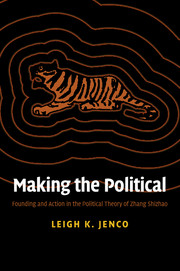Conclusion: A return to beginnings
Published online by Cambridge University Press: 06 July 2010
Summary
Zhang's vision of social change described in the preceding chapters pivots around two major poles: institutions (conceptually identified in the early Republic as a fazhi, rule-by-law position) and people (renzhi, or “rule by man”). As I noted earlier, institutions were a major preoccupation of Zhang's before 1914, but while writing and editing the journal The Tiger his interest turned more theoretical. In the period spanning 1914 to just before 1919, Zhang spends much less time explaining constitutional frameworks and parliamentary structure than he does explaining how those forms will interact with individuals to produce a free and stable Chinese republic. This leads to the second pole of his analysis, the role played by exemplary, talented individuals who foster change in the external world by initiating an internal process of “self-awareness.” He analogizes these self-aware persons to that of Mencius' “great man straddling the world,” characterizing the effect of their actions as “lights in a room” and ascribing to them a force so potent that once their self-awareness is activated, “the work of the state is half-done” (ZQJ 515).
Although his institutional design implies, not entirely incorrectly, a commitment to overtly Western models of governance, Zhang's call to self-awareness gestures toward a model of social change more akin to neo-Confucian voluntarism and self-cultivation than to modern politics. Nowhere does Zhang appeal to mass consciousness or the large-scale social movements that occupied his contemporaries and that, in the form of collective action, continue to occupy many democratic theorists today.
- Type
- Chapter
- Information
- Making the PoliticalFounding and Action in the Political Theory of Zhang Shizhao, pp. 226 - 236Publisher: Cambridge University PressPrint publication year: 2010



